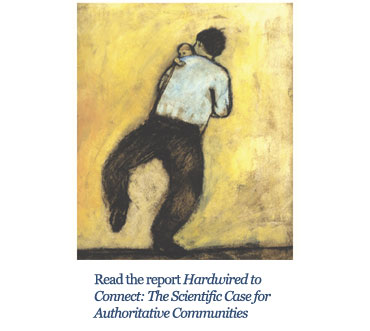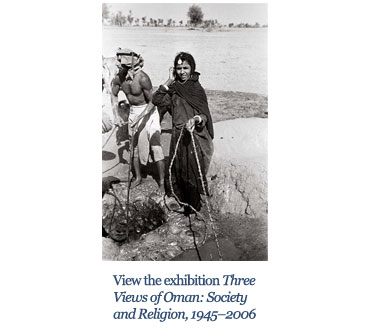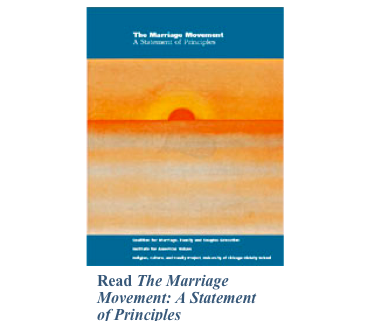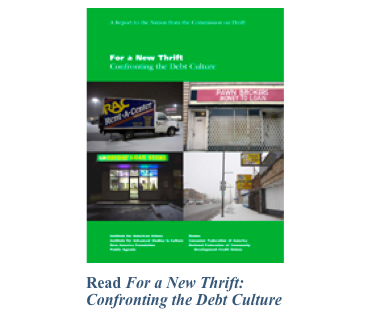The Institute for American Values (IAV) was a think tank in New York City from 1987 to 2016 whose mission was to study and strengthen civil society. Within the focus on civil society, the institute’s priorities during its years of activity included families, fatherhood, marriage, Islam-West dialogue, thrift, and public conversation across differences.
The best way to discover IAV’s 30-year corpus of work it to visit its catalogue.
Here is how IAV described its mission and its model of work:
Almost all think tanks focus either on the activity of government or the needs of individuals. IAV is distinctive in that we focus on civil society – those relationships and associations that exist in between the government and the individual. While often overlooked by both think tanks and policy makers, civil society is a big thing. From families to Little League to church socials to community service projects, the relationships and institutions of civil society take up most of our time and fill up most of our lives. This sphere of society is a primary incubator of our cultural values.
Just as our topic is distinctive, so too is the way we approach our topic. Put simply, we aim to end the culture wars. Ending the culture wars does not mean putting an end to disagreements. Nor does it, or should it, mean splitting every issue down the middle. But it does mean putting an end to the paradigm of polarization that today so completely dominates, and so harmfully distorts, our entire public conversation.
That's why we never call ourselves "liberal" or "conservative." Why we focus so relentlessly on scholarly excellence aimed at reframing core issues. Why we insist on being interdisciplinary, bringing together scholars from across the human and natural sciences. Why we so often form diverse groups of scholars who work together over time, aiming for a fresh approach. Why we give such high priority to conversation and engagement. And why our signature product is the jointly authored public appeal or report.
In 2016, IAV discontinued its think tank work (reports, books, and scholarly conferences) in order to focus solely on creating a new grass-roots organizing initiative focused on reducing political polarization. That year, it established as its DBA (“doing business as”) the name Better Angels. In 2020, the DBA was changed to Braver Angels, and in 2021 Braver Angels replaced Institute for American Values as the organization’s legal name.
What is IAV’s legacy? It consists of its mission, model, and results.
Its mission was to study and strengthen what Edmund Burke called the “little platoons” and what Richard John Neuhaus and Peter Berger called “mediating institutions”—that thick web of associational life that exists between the individual on the one hand and the state on the other. IAV, following many others, called this sphere of life “civil society” and IAV’s leaders and scholars generally viewed a thriving, pluralistic civil society as vital to the successful continuation of the American experiment in ordered liberty.
Today that school of thought does not guide America’s public debate, and sometimes seems nearly invisible, but it exists nevertheless and does at times exert some intellectual and political influence.
IAV‘s model was to bring together diverse scholars from across both the human sciences and the political spectrum for interdisciplinary deliberation, a collective search for truth, and, in its “calls” and “reports to the nation,” jointly offered public argument and recommendations. The general spirit of an IAV enterprise was to seek to bring together the best of liberalism and the best of conservatism for a fresh and higher synthesis serving the common good. IAV did not always succeed in reaching this standard of work (as in the case of gay marriage), but sometimes it did.
This aspiration and model of work were not widespread in 1986, and seem even rarer today, in an age of ideological certitude, intolerance of viewpoint differences, and political hyper-partisanship.
Historically, the rise of the independent think tank in the decades after World War II in part reflected a democratic faith in both the importance and necessity of free inquiry, open debate, and politically independent analysis. IAV’s model of work created in the late 1980s one reflection of that faith.
In retrospect, that faith may have been largely misplaced, as today’s independent think tanks, taken overall, arguably do at least as much to increase ideological rigidity and societal polarization as they do to combat these influences.
IAV’s results in achieving its mission were decidedly mixed. Probably IAV‘s major accomplishment was to help build a broad consensus among U.S. scholars and opinion leaders regarding the importance of the married-couple, two-parent home as both a social good and a legitimate interest of public policy.
On the other hand, actual family life since 1986 has diverged sharply in the U.S., with apparently growing levels of marital and family stability among the approximately one-third of Americans with four-year college degrees and higher incomes, along side growing levels of family disruption and instability among the lesser-advantaged two-thirds of the population. This was not what IAV hoped for. More broadly, by many measurements, American civil society today is weaker than it was in 1986, when IAV began its work.
David Blankenhorn, New York City, September 2021
For further information on IAV:
- Read David Blankenhorn’s speech at IAV’s 1988 founding conference.
- Listen to William Galston's speech at IAV's first annual symposium, in 1993.
- Listen to Barbara Dafoe Whitehead's 1993 speech on IAV's approach to family issues.
- Read comments delivered at the 2009 celebration of IAV 20th anniversary.
- Read a 2011 essay from IAV's board of directors describing the organization's mission.
- Listen to Jonathan Rauch and David Blankenhorn in 2012 discuss ending the culture war on gay marriage.




